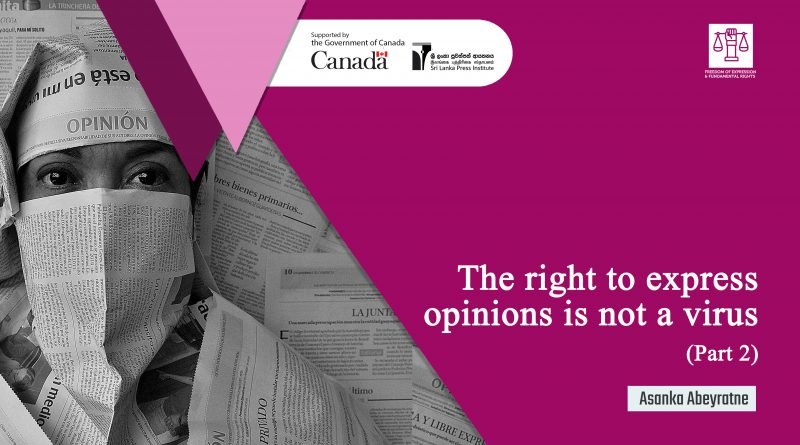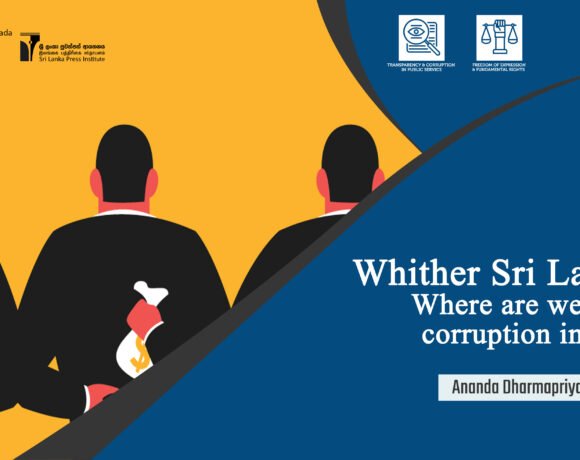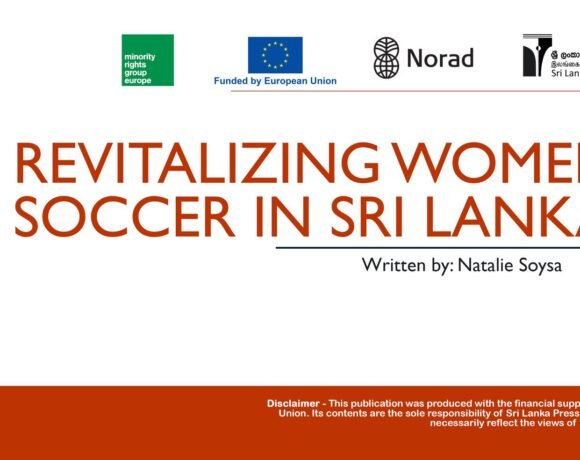Asanka Abeyrathna
Communities that follow various religions and philosophies are present in Sri Lanka. However, within this context, due to Buddhism being given a priority place with our constitution it can be noted that this is a violation of the ICCPR convention. While our Constitution recognizes the ‘right to practice one’s religion’ as a personal right, no provisions have been made towards a person’s right to not follow a religion if they so wish. Further, when the faith that the state gives preference to is used to persecute and punish other religions, it is a violation of the ICCPR covenant.
An article published in the Daily Mirror titled ‘From Islamic Terrorism to Sinhala Buddhist Violence’ talks about arrests of author Kusal Perera for allegedly engaging in racist and religious propaganda and Shakthika Sathkumara for publishing the short story ‘Ardha’. It also talks about the censorship of Malaka Deva Pannariya’s radio programme and the banning of the book ‘Buddha’s Rastiyaduwa’. These are recent examples of the suppression of the right to freedom of expression. Therefore, we should condemn the policy and political agenda of the government based on race and religion and not the criticism leveled against the government that runs it.
The right to freedom of expression has long been suppressed in Sri Lanka and the main tactics used to suppress this freedom was by way of ‘white van’ abductions, disappearances, and arbitrary detention. Attacks on journalists, obstruction of reporting, interrogation without translators, and an abusive policy against human rights defenders are still taking place. Targeting journalists also includes people who distribute newspapers and leaflets. By creating a power structure of intimidation and subjugation, the government seeks to manipulate the right to freedom of expression in line with their political interests. The Prevention of Terrorism Act of 1978 was the primary legal document used by the government to justify restricting freedom of expression. But for freedom of expression, freedom of information, and freedom of the press must continue to function if our society is to be a truly democratic one. In response to the pandemic too, freedom of expression, right to information, and the right to privacy in many parts of the world have been locked up. In declaring a state of emergency, many states have severely restricted fundamental rights, including freedom of expression.
What if the flow of factual and scientific information stops?
Providing timely information on health risks is crucial in responding to a pandemic. Freedom of expression, freedom of the press, and the right to information are essential for pandemic control. Sharing ideas and information during a pandemic is especially important because without the right data, we cannot protect ourselves against the virus. The development of drugs and vaccines to control the virus requires scientific data and epidemiological information. Even maintaining social distance in a pandemic situation can only be done with accurate information. But authoritarian regimes distort the truth and important information. They work by relying on personal beliefs and superstitious solutions. Therefore, the right to information alone is no longer sufficient and it is important to have free space to choose accurate and reliable information. At the very least, the people must break away from the traditional belief in their own politicians. People need to understand that it is wise to consult relevant specialists such as an epidemiologist in the case of the present pandemic. The virus can spread freely if the flow of factual and scientific information stops. Because it is more dangerous, we should be hostile towards the virus instead of towards the right to freedom of expression. The government however, argues that allowing criticism that erodes trust in the government could lead to a more dangerous political storm than the virus.
If individuals are not allowed to criticize governments, it is not clear how the virus’s will affect people’s lives. The United Nations General Assembly’s Special Report on the Promotion and Protection of Freedom of Expression (2020) focuses on the failure of many states to comply with international human rights conventions on freedom of expression during the Covid era. Some governments have not always complied with international human rights law and have enacted laws to combat misinformation. In response to legal challenges to freedom of expression, UNESCO has issued special guidelines for judges and courts at the national and regional levels on the implementation of theoretical frameworks of human rights standards to protect and promote freedom of expression.
However, legal provisions alone are not enough to promote freedom of expression. The most important thing is for individuals to inculcate the practice to tolerate different opinions and respect free speech. The physicist Albert Einstein once said, “For every human being to be able to express his ideas without influence, there must be a sense of tolerance in the whole population”.









